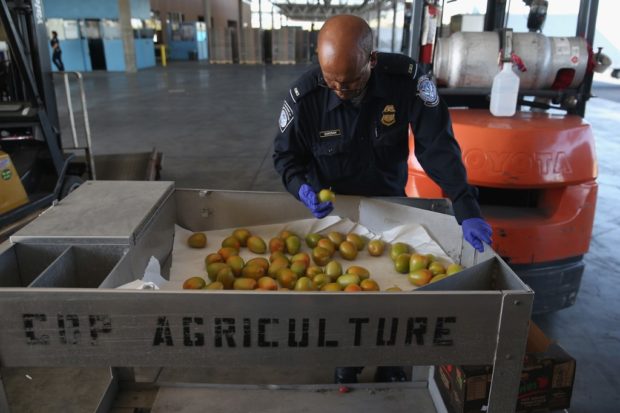New trade tensions as US imposes tariffs on Mexican tomatoes

A U.S. Customs and Border Protection agricultural specialist checks tomatoes brought from Mexico into the United States at the Otay Mesa port of entry on November 14, 2013, in San Diego, California. The US imposed tariffs on Mexican tomatoes on Tuesday, May 7, 2019, adding to tensions between the two neighbors just as debate deepens over their new — but not yet ratified — trade deal with Canada.AFP
MEXICO CITY, Mexico – The United States imposed tariffs on Mexican tomatoes on Tuesday, adding to tensions between the two neighbors just as debate deepens over their new — but not yet ratified — trade deal with Canada.
The 17.5-percent tariffs came into effect after the countries failed to renew an agreement that suspended a US anti-dumping investigation first opened 23 years ago.
The US Commerce Department said Tuesday that negotiations to revise the agreement would continue.
“We remain optimistic that there will be a negotiated solution,” US Commerce Secretary Wilbur Ross said in a statement.
The tariffs could ultimately be blocked should an independent body, the US International Trade Commission, find that no US industry has been harmed by Mexico’s alleged dumping of tomatoes on the US market.
Mexico, which supplies half the fresh tomatoes consumed in the United States, estimated the tariffs would cost its exporters more than $350 million a year.
“We expect many small and medium-sized exporters will find it impossible to cope with this heavy cost,” the economy ministry said in a statement, expressing its “disappointment and concern.”
The Mexican tomato growers’ association denied dumping. Its vice president, Manuel Antonio Cazares, told AFP the industry would take a “heavy hit” from the tariffs, and predicted US consumers would also pay a price.
The United States opened an anti-dumping investigation against Mexico over tomatoes in 1996, but had repeatedly suspended it — and the tariffs that come with it — under a series of deals.
President Donald Trump’s administration said in March the two sides had failed to renew the deal and that the tariffs would come into force.
Mexico exported around $2 billion of tomatoes to the United States last year — its third-largest agricultural export to the United States, after beer and avocados.
Trade tension is rising again between the two countries as their legislatures prepare to open debate on ratifying the United States-Mexico-Canada Agreement (USMCA), the updated version of the 25-year-old North American Free Trade Agreement (NAFTA).
Trump, who regularly criticized NAFTA as the worst deal ever signed by the United States, faces a battle with opposition Democrats in the House, who have criticized the deal for not doing enough to protect US jobs by improving labor conditions and wages in Mexico.
Mexico, which sends more than 80 percent of its exports to the United States, is for its part unhappy with Trump’s tariffs on its steel and aluminum exports, and his threat to impose 25-percent tariffs on its auto exports over what he sees as a “crisis” of illegal immigrants and drugs crossing the border. /cbb